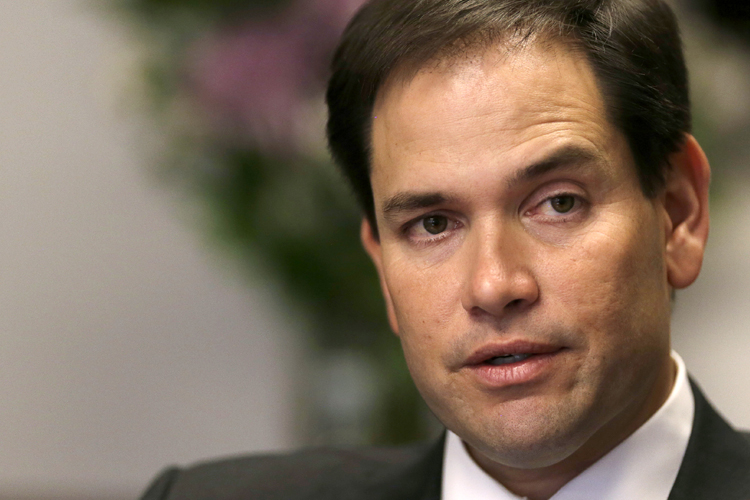Marco Rubio: remember him? Florida’s junior senator has been struggling to rekindle the adulation and enthusiasm that attended his brief reign as the “savior” of the Republican Party, which has to be frustrating, given his obvious intention to run for president. As the New York Times reported this morning, his efforts have been further complicated by the fact that Jeb Bush – his political mentor – has overshadowed Rubio with an aggressive (and largely successful) push to position himself as the 2016 favorite of the Republican establishment. The two men occupy much of the same political space, and Jeb is steadily pushing Rubio out of it.
But, according to the Times, Rubio is not lacking for determination:
Meanwhile, Mr. Rubio is racing ahead like a man gearing up for a presidential run. His mini-tour for “American Dreams” – his new book, which reads like a blueprint of policy prescriptions for a presidential bid – has taken him through the first four nominating states in the 2016 Republican primary season.
And though he is not expected to make any official announcement until April, he is quietly telling donors that he is committed to running for president, not reelection to the Senate. (During a stop in Las Vegas, Mr. Rubio met privately with Sheldon Adelson, the casino magnate and major Republican donor. Neither Mr. Rubio nor Mr. Adelson’s team would comment on what the two men had discussed.)
There’s something to be said for throwing oneself wholeheartedly into whatever one chooses to do, but if this is true, then Rubio’s taking a huge risk.
You look at the other potential Republican candidates and they all have various and distinct identities. Jeb is the establishment favorite, Cruz is the firebrand conservative, Rand is the libertarian goofball, Huckabee/Santorum/Carson are the social conservative darlings, Walker is the conservative “results” governor, etc. Each of these identities carries with it a built-in constituency. What is Rubio’s identity? He’s been working on that question for the better part of a year now and what he seems to have settled on is “foreign policy guy.”
Rubio spends a lot of time on the Senate floor and cable news talking about foreign policy, and this has convinced a number of reporters and pundits that he’s some sort of foreign policy whiz. And while that might impress talking heads, it’s debatable how much mileage he’ll get out of that in a GOP primary. With the exception of Rand Paul, Rubio’s foreign policy doesn’t really differ all that much from the rest of the Republican field. They all want more American leadership and more boots on the ground to fight ISIS. They all want the Cuban embargo to remain in place, they all want a more belligerent posture towards Iran, and they’re all fighting to position themselves as the next Ronald Reagan. Rubio speaks about foreign policy issues more fluently than, say, Scott Walker, but in the end they’re pretty much all singing from the same hymnal. (And for all the praise Rubio gets for his foreign policy chops, no one seems to notice that he’s been wildly inconsistent when it comes to ISIS and Syria.)
And even if Rubio establishes himself as the most commander-in-chief-like candidate, he still has to deal with the massive credibility gap he put between himself and the conservatives who enthusiastically backed his 2010 Senate race. Rubio sided with Barack Obama to push for comprehensive immigration reform, which (you may have noticed) is not especially popular with conservatives. Almost immediately after getting his immigration reform bill passed, he abandoned his own principles (and, eventually, his own legislation) to try and get right with the right. So not only is he a sellout, he’s also a flake and a panderer.
Who knows? Maybe I’m underestimating the degree to which Republican voters are looking for a president who sounds sufficiently tough on foreign policy, or maybe I’m overestimating the capacity of the conservative base to hold grudges for past apostasies. Just yesterday, though, Rubio was confronted at New Hampshire town hall on his immigration record and was asked if he’d commit to deporting every single undocumented immigrant in the country. Seems like he’s going to get a lot of this, in spite of all his efforts to convince conservatives that he’d learned his lesson. On top of all that, the GOP’s big donors and influential establishment figures have lost their enthusiasm for Rubio and are lining up behind Jeb Bush’s all-but declared his candidacy. Jeb has many of the same policy weaknesses as Rubio, but he also will have a ton of money and a lot of institutional support.
Right now it’s hard to see the rationale or the path to success for Rubio 2016, and that could have ramifications beyond his own political career. The Senate map in 2016 already isn’t looking good for the GOP – the party is defending a lot seats in hostile territory and stands a real chance of losing control of the Senate. If Rubio is serious about not running for reelection, he’ll only make that map worse. The party will lose the advantages of incumbency in Florida and be stuck defending an open seat in a state that’s gone Democratic twice in the last two presidential elections.
But at the very least, Rubio can argue that he’s taking a more principled stance than Rand Paul. Both men are considering White House bids, both men are also up for reelection to the Senate in 2016, and both men are from states that have laws prohibiting candidates from running for two offices at the same time. Only Rubio, however, is content to adhere to that law. Rand Paul is desperately trying to rearrange the machinery of state government so he can run for president without having to give up his Senate seat. So, if nothing else, Rubio can claim a moral victory.

